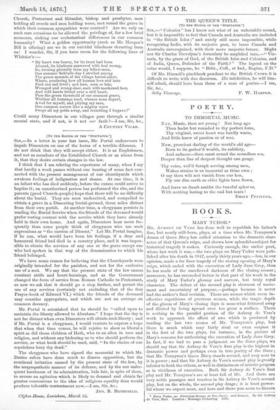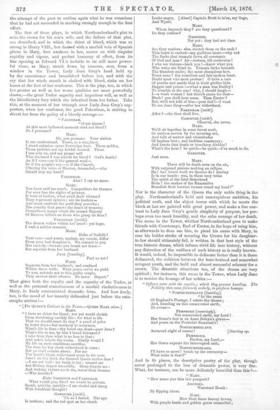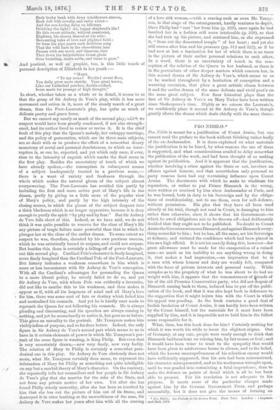BOOKS.
MARY TUDOR.
Mn. AUBREY DE VERE has done well to republish his father's fine, but nearly still-born, plays, at a time when Mr. Tennyson's drama of Queen Mary has called attention to the dramatic char- acter of that Queen's reign, and shown how splendid a subject for historical tragedy it makes. Curiously enough, the earlier poet, whose last work it was,—the two plays on Mary Tudor were pub- lished after his death in 1847, nearly thirty years ago,—has, in our opinion, made a far finer tragedy of the stormy opening of Mary's reign, which ended with the execution of Lady Jane Grey, than he has made of the unrelieved darkness of the closing scenes ; moreover, he has succeeded better in that part of his work in the study of Mary Tudor's gloomy and narrow, but truly royal character. The defect of the second play is slowness of move- ment and uncertainty of purpose,—perhaps because it never had the author's final revision. There are scenes which seem in- effective repetitions of previous scenes, while the tragic depth of the gloom of Mary's closing days is somewhat frittered away and diluted by being spread over too great a surface. There is nothing in the parallel portion of Sir Aubrey de Vere's work to approach the effect of awe which is produced by reading the last two scenes of Mr. Tennyson's play, but there is much which may fairly rival or even surpass it in the first of the two plays, for instance, in the picture of Mary's remorse for authorising the execution of Lady Jane Grey. In fact, if we had to pass a judgment on the three plays, we should say that Sir Aubrey de Vere's first play is the highest in dramatic power and perhaps even in true poetry of the three ; that Mr. Tennyson's Queen Mary stands second, and very near to it in power ; and that Sir Aubrey de Vere's second play is greatly inferior to both the others, as well in distinctness of artistic purpose as in vividness of execution. Both Sir Aubrey de Vere's first play and Mr. Tennyson's are at least full of life. And there are very noble passages and touches in Sir Aubrey de Vere's second play, but on the whole, the second play drags ; it is least power- ful where we expect most, and here and there you seem to discern * Mary Tudor. en Historical Drama, in Two Pa,-(o; and Bonnets. By Sir Aubrey de Tare, Bart. London: Montagu Pickering. 1876.
the attempt of the poet to outline again what he was conscious that he had not succeeded in marking strongly enough in the first effort.
The first of these plays, in which Northumberland's plot to seize the crown for his son's wife, and the failure of that plot, are described, and in which the thirst of blood, which was so strong in Henry VIII., but dashed with a morbid vein of Spanish gloom in Mary, first awakens in her, moves on with singular rapidity and vigour, and perfect harmony of effect, from its
• fine opening at Edward VI.'s bedside to its still more power- ful close, as Mary, struck down by remorse, sees, from a window in the Tower, Lady Jane Grey's head held up by the executioner and brandished before her, and with the cry that her whole mouth is choked with blood, sinks on her -knees at the feet of her confessor. This is the play, too, in which her greater as well as her worse qualities are most powerfully drawn,—the great Tudor sagacity and imperious will, as well as the bloodthirsty fury which she inherited from her father. Take this, at the moment of her triumph over Lady Jane Grey's sup- porters, when her confessor, the good Fakenham, is striving to divert her from the policy of a bloody revenge :— " FAKEXHAM.
"Great Queen!
At this most hallowed moment shed not blood!
Do I presume? •
MARY.
Sir, you presume. Your station Is our confessional. There, as a daughter, I stand submiss—your Sovereign here. These nobles, These prelates are my lawful council. These I can rely on, and my proper self.
Who dreamed I was athirst for blood ? God's death!
An if I were—or if the general weal—
Or if the people's cry—or if the Church, Uttering the voice of Heaven, domanded,—who Should stay my hand?
FAKENHAM.
Alas ! I say no more.
MARY.
You have said too much. Competitors for thrones For ever lose the rights of privacy.
If tools of faction, what avail their virtues?
They represent opinion; are its loaders — And must confront the peril they provoke ; The penalty that gnaws the heart of treason; Promothean pangs which the roused Majesty Of Heaven inflicts on those who grasp its fires !
FAKENIIAM [aside].
The demon wakes within her heart : yet hope. I wait a milder moment.
MARY.
Duke of Suffolk! Your case—and yours, madam, my cousin, differ From your bad daughter's. We commit to you Her custody—beware you break not trust— But separate from her husband.
JANE [kneeling].
MARY.
Separate from her husband; and confined Within those walls. What grace soe'er we yield To you, extends not to this guilty couple. They answer their offence. No more. Depart."
That gives both the royalty and the sagacity of the Tudor, as well as the personal consciousness of a morbid vindictiveness in Mary, in finely concentrated dramatic form. And how finely,
• too, is the mood of her insanity delineited just before the cata- • strophe arrives !—
" [The QUEEN'S Cabinet in the Tower.—QUEEN MARY alone.]
MARY.
"I have no thirst for blood; nor yet would shrink
From shortening earthly life : for what is life That we should court its stay ? a pearl of price In festal days—but mockery to mourners. What's life to thee—thy loved one dead—poor Jane? What's life to me, by him I loved betrayed ? I take from thee what is no loss to thee ; And infich infects the realm. Gladly would I My life on such conditions sacrifice.
The timo for thy short widowhood is come : But yo shall reunite above. For me
The heart's blank widowhood must be for over.
Jane ! on thy block the throned Queen envies thee I —I am not well : my brain is hot : around me
Are flitting shapes unearthly. Sleep forgets me
And waking visions mock me, worse than dreams. —Who knocks?
Enter GARDINER and FAKENHAM. What would you, Sirs? we would be private. Speak, quickly, quickly—I am chafed and stung With troublous thought!
GARDINER [aside].
'Tis as I feared. Her eye Is restless; and the red spot on her cheek . Part us not! GARDENER.
Not yet : they had not time.
MARY.
See they confess: else, stretch them on the rack ! This heart is racked—my guiltless heart—why not The limbs that trample down all covenants Of God and man ? Ay—torture, till confession ! I who see visions—hark you!—know what you Who wake are blind to. Treason lurks beneath The blandest smile; the most obsequious bow. Trust none ! the comeliest and fair-spoken least.. Doubt most who most profess! 0 have a care Of youths and maids that in their girdles hide Dagger and poison !—what a man was Dudley I To tremble at the axe! why, I should laugh- I—a weak woman! but there's cause for that--- Hush! you shall hear anon. Then Exeter? But, we'll not talk of him—poor fool I—I want To see Jane Grey—after her widowhood.
FAKBNHAM [aside].
After ?—she then shall live.
GARDINER [aside].
0 serve, she raves.
MARY.
We'll sit together in some forest nook, Or sunless cavern by the moaning sea, And talk of sorrow and vicissitudes Of hapless love ; and luckless constancy ; And hearts that death or treachery divides!
What's the hour ? be quick—be quick—I've much to do..
GARDINER.
Looks angry. [Aloud] Captain Brett is ta'en, my liege, And Wyatt.
MARY.
Whom impeach they? are they questioned ?
Do they confess?
Just noon.
MARY. .
There will be death soon on the air, With outpread pinions making an eclipse.
Ha! ha! brave work we Queens do ! destiny Is in our hands: yea, in these very veins The spirit of the fatal Sisterhood Riots ! the snakes of the Eumenides Brandish their horrent tresses round my head!"
Nor is the character of the Queen the only noble thing in the play. Northumberland's bold and unscrupulous ambition, his political craft, and the abject terror with which he meets the block at last are painted with great power, and make a fine con- trast to Lady Jane Grey's gentle simplicity of purpose, her per- haps even too meek humility, and the calm courage of her death. The scene in the Tower, whither Northumberland goes to make- friends with Courtenaye, Earl of Exeter, in the hope of using him, as afterwards he does use him, to plead his cause with Mary, in case his bolder stroke of securing the Crown for his daughter- in-law should ultimately fail, is written in that best style of the true historic drama, which infuses vivid life into history, without any distortion of the outlines of such history as is really known.. It would, indeed, be impossible to delineate better than it is there delineated, the collision between the hare-brained and somewhat arrogant youth, and the bold and almost successful schemer for a crown. The dramatic situations too, of the drama are very spirited ; for instance, this scene in the Tower, when Lady Jane is to receive the homage of her nobles :—
" Officers enter with the regalia ; which they present kneeling. The
Nobility then come forward, orderly, to perform homage.
" NORTHUMBERLAND [kneeling]. 4 In the name Of England's Peerage, I salute the Queen;
And, kneeling on this consecrated earth,
Do swear— PEMBROKE [sneeringly]. -
Not consecrated earth, my Lord ! Her Grace's foot is on Anne Boleyn's grave— And yours on the Protector Somerset's!
NORTHUMBERLAND.
Accursed night of omens! [Starting up
PEMBROKE.
Pardon, my Lord,—
Her Grace expects the interrupted oath.
NORTHUMBERLAND.
I'll have no more ! break up the ceremony— What noise is that?"
And in fit places, the descriptive poetry of the play, though never prolonged to the loss of dramatic power, is very fine. What, for instance, can be more delicately beautiful than this ?—
" MARY.
"How name you this fair prospect?
ARUNDEL.
Wanstead Heath : By Epping chase.
MARY.
How bleat these breezy downs, With purple heath and golden gorse enamelled ;
Each bosky bank with dovry windflowers strewn, Each dell with cowslip and rathe violet— And the sun-loving daisy on hill-tops Drinking the light ! Ah, happy shepherd's life ! He this sweet solitude' without constraint, Explores, his chosen damsel at his side: Recounting tales of love and plighted faith : Or from his pipe pours such delicious song That the wild hare in the close-bitten lane Pauses with ear erect, and timorous deer That down the labyrinthine forest glade Goes bounding, starts aside, and turns to gaze."
And poetical, as well as graphic, too, is this little touch of personal description of Elizabeth in her youth :—
"Many.
"To my arms! Pardie ! sweet Bess, You daily grow more stately. Your great brows, Like our Cathedral porches, double-arched, Seem made for passage of high thought."
In short, whether taken as a whole or in detail, it seems to us that the grasp of Sir Aubrey de Vere's play, while it has more movement and action in it, more of the steady march of a great drama, than the Poet-Laureate's play, has quite as much of delicate poetry and grave force.
But we cannot say nearly as much of the second play-, whir.13 we suspect would have been greatly condensed, if not also strength- ened, had its author lived to review or revise it. It is the chief fault of this play that the Queen's malady, her unhappy marriage, and the policy of persecution, which are its three main subjects, are so dealt with as to produce the effect of a somewhat dreary monotony of moral and personal desolateness, to which no inter- ruption is, or can be, expected, and yet which only once, if ever, rises to tlie intensity of anguish which marks the final scene in the first play. Besides the uncertainty of touch of which we
have already spoken,—the resumption in subsequent scenes of a subject inadequately treated in a previous scene,—
there is a want of variety and freshness through the whole which makes the natural gloom of the subject almost overpowering. The Poet-Laureate has avoided this partly by including the first and more active part of Mary's life in the drama, partly by giving us a little more of the popular view of Mary's policy, and partly by the high intensity of the closing scenes, in which the gloom of the subject deepens into a thick blackness which is no longer oppressive, because it is deep -enough to purify the spirit "by pity and by fear." But Sir Aubrey de Vere falls short of this. Indeed, as we have said, we do not think it was quite possible to reserve for the close of Mary's life any picture of tragic failure more powerful than that in which he plunges her at the close of the earlier drama. To some extent we suspect he was, therefore, daunted by his own previous success, which he was artistically bound to surpass, and could not surpass. But besides this, there is certainly a falling-off of power through- out this second play. Cardinal Pole's character is finely imagined, more finely imagined than the Cardinal Pole of the Poet-Laureate.
But history indicates a weakness somewhere in him which is more or less inconsistent with Sir Aubrey de Vere's conception.
With all the Cardinal's advantages for persuading the Queen to a more liberal policy, he utterly failed to do so, and yet
Sir Aubrey de Vere, with whom Pole was evidently a favourite, did not like to ascribe this to his weakness, and thus makes it . appear as if, with all his largeness of mind and all Mary's1/41ove
for him, there was some sort of fate or destiny which foiled him . and neutralised his counsels. And yet he is hardly once made to reproach the Queen for not following his counsels. He is always pleading and discoursing, and his speeches are always coming to nothing, and yet he seems hardly to notice it, but goes on as before. This gives an unreality to the portrait. Mr. Tennyson makes him visiblyinfixm of purpose, and so far does better. Indeed, the only figure in Sir Aubrey de Vere's second part which seems to us to have in it certain elements of power in which Mr. Tennyson's por- trait of the same figure is wanting, is King Philip. But even that Is very uncertainly drawn,—now very finely, now very feebly. The relation of Mary to Philip is certainly a somewhat para- doxical one in this play. Sir Aubrey de Vere obviously does not mean, what Mr. Tennyson certainly does mean, to represent the infatuation of Mary for Philip as something not quite intelligible on any but a morbid theory of Mary's character. On the contrary, she repeatedly tells her counsellors and her people in Sir Aubrey de Vere's play that she marries for the sake of the State, and not from any private motive of her own. Yet after she has found Philip utterly unworthy, after she has been so insulted by him that she has cut the picture of him out of its frame, and destroyed it in utter loathing at the unworthiness of the man, Sir Aubrey de Vere makes her yearn after him with all the craving
of a love-sick woman,—with a craving such as even Mr. Tenny- son, in that stage of the estrangement, hardly ventures to depict.. Once Philip had " cast" her from him (p. 223), once again he had insulted her in a fashion still more intolerable (p. 259), so that she had torn up his picture, and scattered him, as she expressed it, "from out the desecrated temple" of her heart ; and yet she still craves after him and his presence (pp. 312 and 322), as if he had now at last a fascination for her of which there is no trace in the picture of their earlier personal relations to each other.. In a word, there is an uncertainty of touch in the con- ception of the relation of the Queen to her husband, as there is in the portraiture of other deeper matters which concern her, in this second drama of Sir Aubrey de Vere's, which seems to us- to be marked throughout by a hesitation of conception and a wavering execution, that place a great artistic chasm between it and the earlier drama of the same delicate and vivid poet's On the same great subject. Few finer historical plays than the first of Sir Aubrey de Vere's on Mary Tudor have been written since Shakespeare's time. Highly as we esteem the Laureate's, we confidently place it second to Sir Aubrey de Vere's, though greatly above the drama which deals chiefly with the same theme.




































 Previous page
Previous page